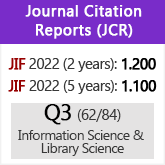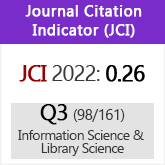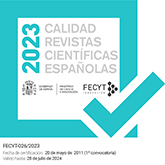Contribution of Spanish universities to the experts panel of ANECA’s ACADEMIA program
DOI:
https://doi.org/10.3989/redc.2013.4.1075Keywords:
Universities, ACADEMIA program, ANECAAbstract
This work analyses the contribution of different Spanish universities to the experts panel of ANECA’s ACADEMIA program. This program consists of the initial evaluation of university teaching staff. The study looked at the distribution of experts by university and the relationship between the number of permanent teaching staff and the six year research periods obtained by the university. Results suggest that a relatively few universities supply a great number of experts to the ACADEMIA program. In addition, a positive correlation exists between the number of experts and the number of six year research periods or number of permanent teaching staff. These results suggest that the pool of evaluators reflects the reality of Spanish universities. No significant bias seems to exist in the appointment of experts.
Downloads
References
ANECA (2009). Informe al Patronato sobre la acreditación nacional para el acceso a los cuerpos de profesorado universitario (ANECA, www.aneca.es, consulta realizada el 10-mar-13).
Agrait, N.; Poves, A. (2009). Informe sobre los resultados de las evaluaciones de la CNEAI. La situación en 2009 (http://www.mecd.gob.es/ministerio-mecd/organizacion/organismos/cneai/memorias-informes.html, consulta realizada el 10-mar-13).
Behrens, H.; Luksch, P. (2011). Mathematics 1868-2008: a bibliometric analysis. Scientometrics, vol 86 (1), 179-194. http://dx.doi.org/10.1007/s11192-010-0249-x
Buela-Casal, G.; Sierra, J.C. (2007). Criterios, indicadores y estándares para la acreditación de profesores titulares y catedráticos de Universidad. Psicothema, vol 19 (4), 537-551.
Buela-Casal, G.; Bermúdez, M.P.; Sierra, J.C.; Quevedo-Blasco, R.; Castro, A.; Guillén-Riquelme, A. (2012). Ranking de 2010 en producción y productividad en investigación de las universidades públicas españolas. Psicothema, vol 23 (4), 527-536.
De Filippo, D.; Casani, F; García-Zorita, C.; Efraín-García, P.; Sanz-Casado, E. (2012). Visibility in international rankings. Strategies for enhancing the competitiveness of Spanish universities. Scientometrics, vol 93 (3), 949-966. http://dx.doi.org/10.1007/s11192-012-0749-y
Garfield, E. (1980). Bradford's Law and related statistical pattern, Essays of an Information Scientist, vol 4, 476-483 (disponible en http://garfield.library.upenn.edu, consulta realizada el 10-mar-13).
Jiménez-Contreras, E.; Moya-Anegón, F.; Delgado López-Cózar, E. (2003). The evolution of research activity in Spain. The impact of the National Commission for the Evaluation of Research Activity (CNEAI). Research Policy, vol 32 (1), 123-142. http://dx.doi.org/10.1016/S0048-7333(02)00008-2
Ortiz-de-Urbina-Criado, M.; Mora-Valentín, E.M. (2013). El sistema de acreditación del profesorado a través del Programa ACADEMIA: Evolución y cambios. Revista Española de Documentación Científica, 36 (1):en004.
Rousseau, R. (1994). Bradford curves. Information Processing and Management, vol 30 (2), 267-277. http://dx.doi.org/10.1016/0306-4573(94)90069-8
Sierra, J.C.; Buela-Casal, G.; Bermúdez-Sánchez, M.P.; Santos-Iglesias, P. (2009). Opinión de Profesores Titulares y Catedráticos de Universidad acerca de criterios y estándares para la acreditación del profesorado universitario. Revista Española de Documentación Científica, vol 32 (3), 89-100. http://dx.doi.org/10.3989/redc.2009.3.678
Published
How to Cite
Issue
Section
License
Copyright (c) 2013 Consejo Superior de Investigaciones Científicas (CSIC)

This work is licensed under a Creative Commons Attribution 4.0 International License.
© CSIC. Manuscripts published in both the printed and online versions of this Journal are the property of Consejo Superior de Investigaciones Científicas, and quoting this source is a requirement for any partial or full reproduction.All contents of this electronic edition, except where otherwise noted, are distributed under a “Creative Commons Attribution 4.0 International” (CC BY 4.0) License. You may read here the basic information and the legal text of the license. The indication of the CC BY 4.0 License must be expressly stated in this way when necessary.
Self-archiving in repositories, personal webpages or similar, of any version other than the published by the Editor, is not allowed.

















